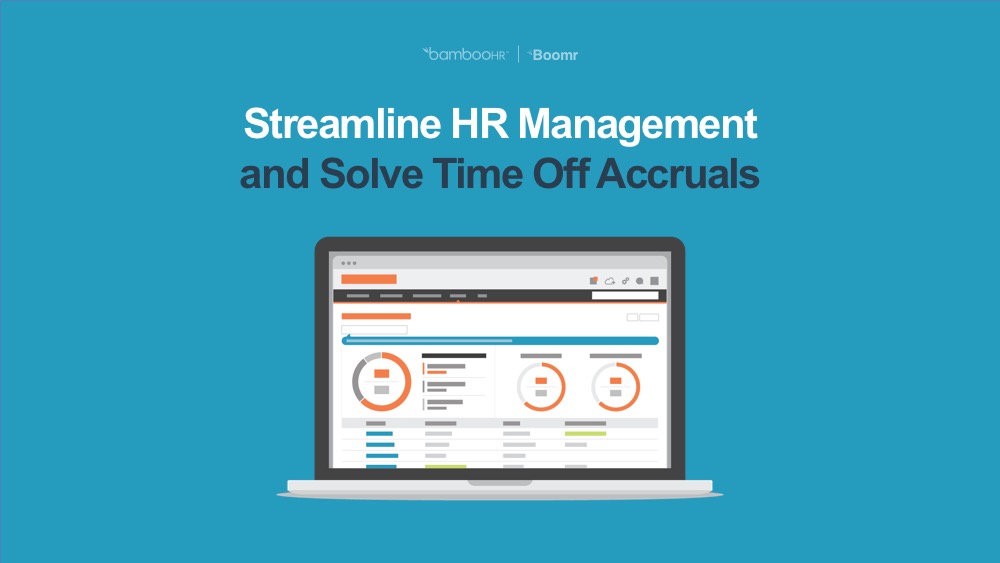-
Our Software
Get a bird's-eye view or dive deep into every feature of BambooHR.
Overview-
Product Overview
Product Overview
Find out how our five product pillars support what really matters: your people.
-
Video Tour
Video Tour
See a full product overview or take a short video tour of our top eight features.
Overview
Read or watch a brief tour of BambooHR.
-
Product Overview
-
People Data & Analytics
-
Employee Records
Employee Records
Say goodbye to filing cabinets, and say hello to secure, centralized, and organized employee data.
-
Workflows & Approvals
Workflows & Approvals
Open up those bottlenecks with organized and streamlined processes.
-
Reporting & Analytics
Reporting & Analytics
Easy, beautiful reports in seconds? That's a good look.
-
Mobile App
Mobile App
Put the entire BambooHR experience in the hand of every employee.
People Data & Analytics
Isn't it time all that information you've been collecting started working for you?
-
Employee Records
-
Hiring
-
Applicant Tracking System (ATS)
Applicant Tracking System (ATS)
Never miss another awesome hire.
-
Mobile Hiring App
Mobile Hiring App
Because great hires can happen anywhere and anytime.
Hiring
A great candidate experience starts here.
-
Applicant Tracking System (ATS)
-
Onboarding
-
New-Hire Onboarding
New-Hire Onboarding
Less paperwork, more person-to-person.
-
Offboarding
Offboarding
Make the best of every goodbye.
-
Electronic Signatures
Electronic Signatures
Save time, save trees, and track every signature down to the minute.
Onboarding
Make exceptional first days the rule.
-
New-Hire Onboarding
-
Compensation
-
Time Tracking
Time Tracking
Punch in and out without wanting to punch someone.
-
Paid Time Off (PTO)
Paid Time Off (PTO)
Mobile-enabled vacation requests and multiple approvals, PTO forecasting, and more.
-
Payroll
Payroll
Everyone should feel good about payday.
Compensation
Keep track of every penny, hour, and PTO request without breaking a sweat.
-
Time Tracking
-
Culture
-
Performance Management
Performance Management
Start doing performance reviews that really improve performance.
-
Employee Satisfaction with eNPS
Employee Satisfaction with eNPS
Put your finger on the pulse of employee engagement.
Culture
Your people are your most valuable asset.
-
Performance Management
-
Compare Packages
Compare Packages
Get the BambooHR that's right for you, no matter where you are in your journey.
-
We Set You Free
Why BambooHR
A few good reasons to choose BambooHR for your business.
We Set You Free
Learn how our software can make you more strategic and more available for your people.
-
Award-Winning Service & Support
Award-Winning Service & Support
You'll love our implementation...and everything that comes after it, too.
-
Industry Solutions
-
Construction
Construction
Conquer paperwork in the office and put tools like time tracking, PTO, and more on the job site with one easy-to-use, mobile-ready HR system.
-
Finance
Finance
Science-backed performance management and award-winning applicant tracking are just two ways BambooHR keeps your firm competitive in a cutthroat market.
-
Healthcare
Healthcare
Revitalize your HR practice with all-in-one HR software that helps you tackle paperwork and peoplework in one easy and secure system.
-
Technology
Technology
Become a top-talent magnet with PCMag’s Editors’ Choice for best all-around HR software in 2021—recruiting, onboarding, and performance tools, it’s all here.
Industry Solutions
Whatever your industry, BambooHR offers the features, flexibility, and customization you need to handle HR tasks easily and efficiently.
-
Construction
-
Case Studies
Case Studies
Come see how customers are solving problems and revolutionizing their HR processes using BambooHR.
-
BambooHR Marketplace
BambooHR Marketplace
See how nicely BambooHR plays with everyone else in the neighborhood.
-
Blog
Blog
Get new and unique perspectives on HR tech, best practices, and current events every week.
-
The Era Podcast
The Era Podcast
A new podcast from BambooHR about putting your people first.
-
Content Library
Content Library
Browse our library of ebooks, infographics, how-to guides, and unique research.
-
Webinar Library
Webinar Library
Stream HR insights right to your screen. Watch one of our 100+ partner webinars absolutely free.
-
HR 101 Guide
HR 101 Guide
We wrote the book on everything HR.
-
HR Glossary
HR Glossary
From Applicant Tracking System to Work/Life Balance, we can help you become a walking HR encyclopedia.
-
HR Software Calculator
HR Software Calculator
Want to know how much your organization could save with the right HRIS? Start here.
-
HR Crisis Recovery
HR Crisis Recovery
From hiring and onboarding remotely to supporting employee mental health, find relevant HR resources for helping your business recover from a crisis.
-
Product Updates
Product Updates
Learn about all of the exciting changes that are happening to our platform.
Resources
Browse our HR content and webinar libraries, read the latest blog articles, or check out our HR Software Calculator.
-
Our Story
Our Story
Who we are, where we came from, and why we make HR software.
-
Media
Media
This is where you’ll find the latest news and resources from BambooHR.
-
Careers
Careers
Are you awesome? Come work with us!
-
Events
Events
Join us at all the virtual and non-virtual events we're throwing or attending.
-
Partner With Us
Partner With Us
Join one of our partner programs.
-
Contact
Contact
Get in touch with BambooHR.
About BambooHR
Learn about the company, find press and media details, or apply to work with us!



